Agriculture & Environment
Department of Geography, Geo-informatics & Climatic Sciences reviews programmes
Published
4 years agoon
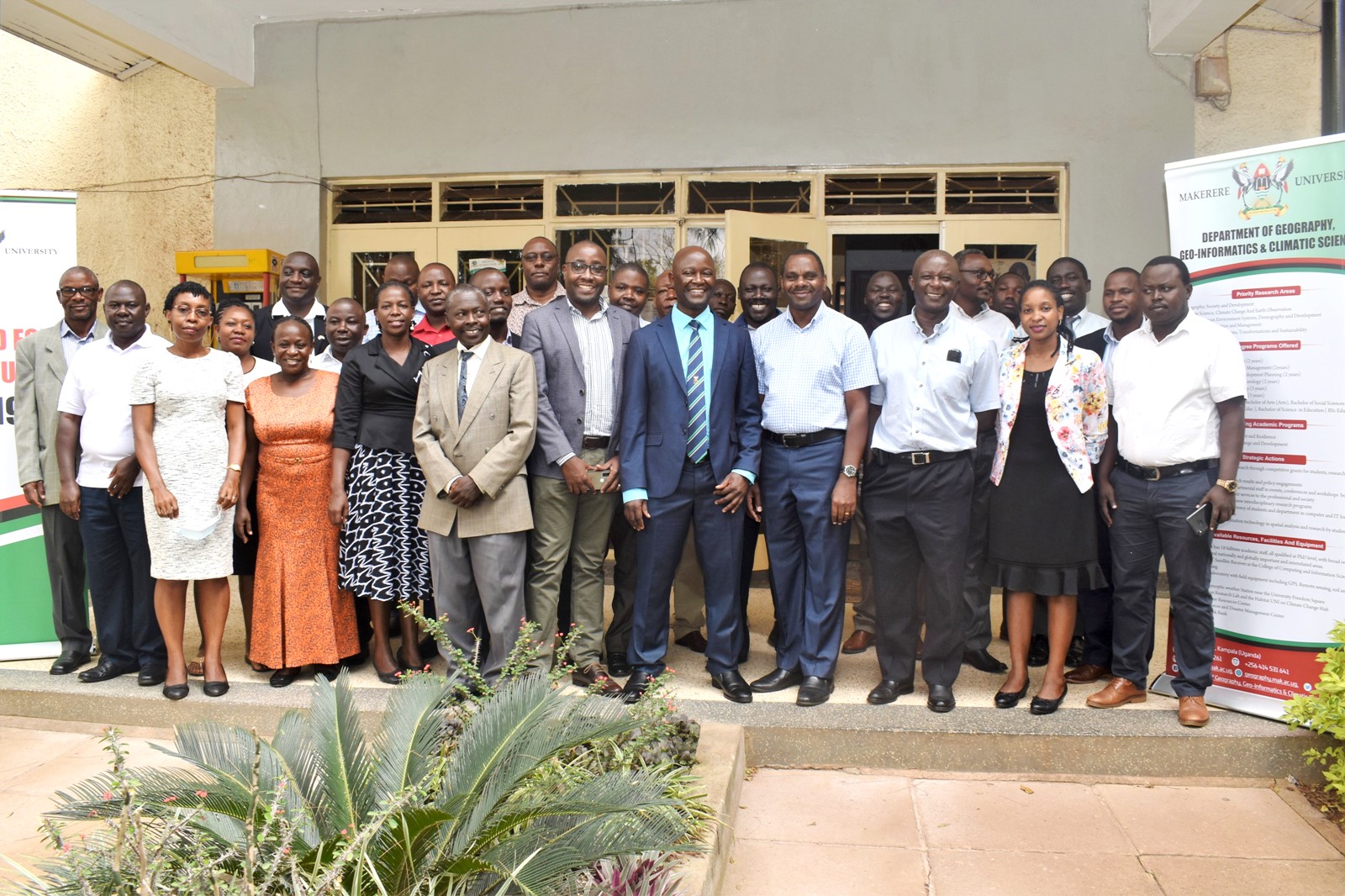
In a bid to align its programmes to the national and global development agenda, the Department of Geography, Geo-informatics and Climatic Sciences, College of Agricultural and Environmental Sciences (CAES), Makerere University conducts periodical reviews in consultation with different stakeholders.
The Department is currently reviewing five programmes namely: Master of Land Use and Regional Development Planning, MSc Disaster Risk Management, Master of Geographical Sciences, Bachelor of Geographical Sciences, and BSc Meteorology.
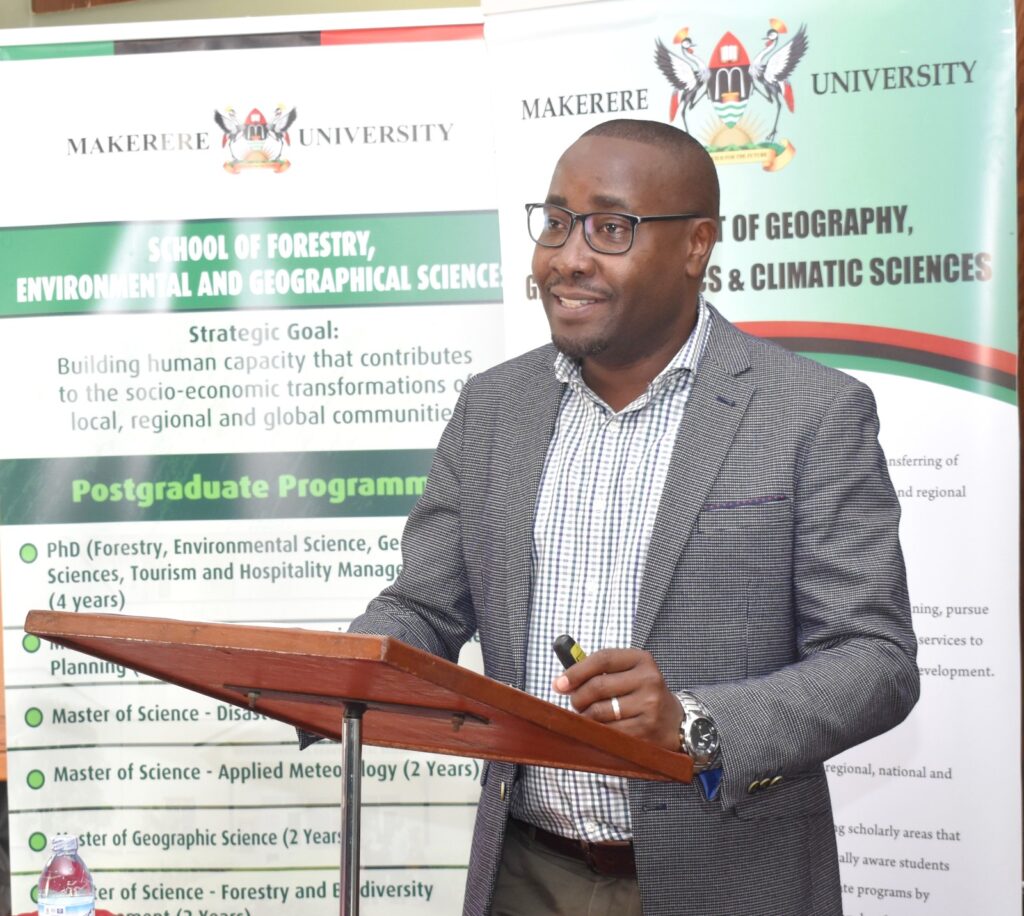
Besides aligning the programmes to the national and global development agenda, the review processes is intended to improve marketability and innovativeness of the programmes, address industry needs and contemporary challenges, improve practical training and interdisciplinarity, and to strengthen analytical skills amongst students.
Since 2017, the department has been engaging different stakeholders including individual staff members, students, alumni and industry actors who have provided enriching contributions. The reviewed programmes will be rolled out in the Academic Year 2023/2024.
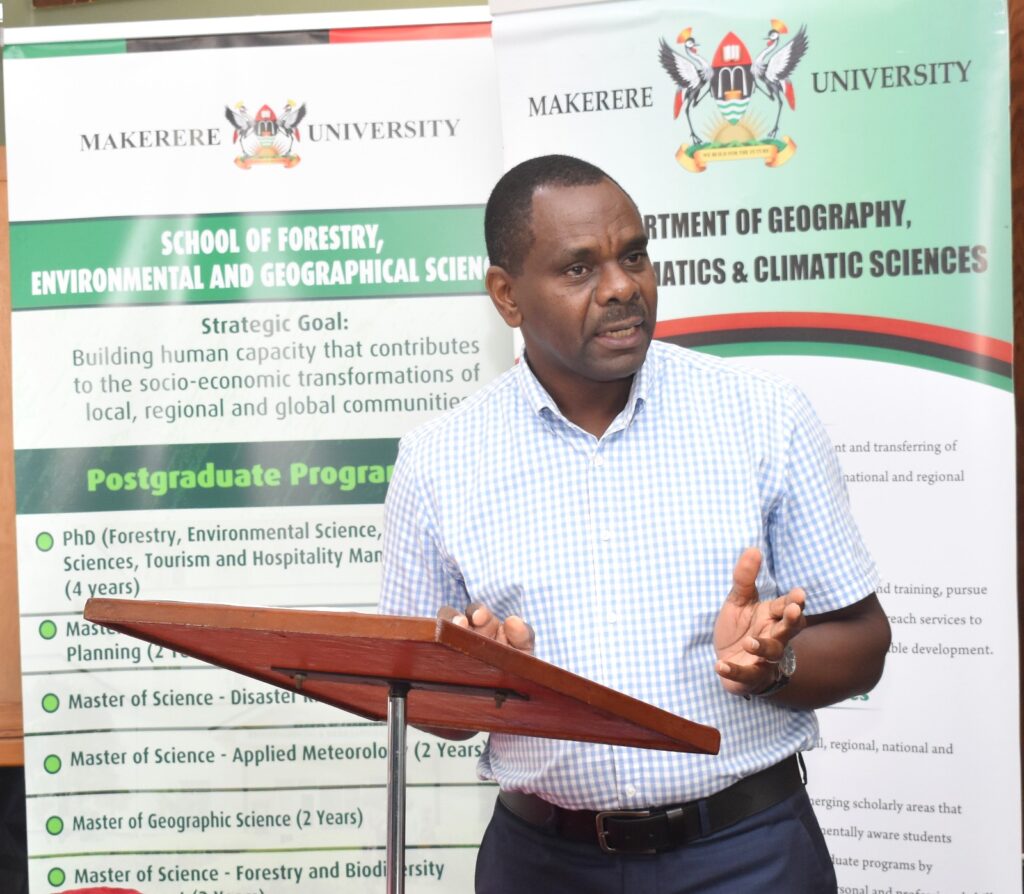
Stakeholder engagement
To further enrich the programmes, the Department held a two-day stakeholder engagement to receive feedback on the proposed amendments. The activity held on 3rd-4th August 2022 at the School of Forestry, Environmental and Geographical Sciences and coordinated by the Head of Department, Prof. Frank Mugagga and Dr Paul Mukwaya was attended by academics from Makerere University College of Engineering, Design, Art and Technology (CEDAT); College of Education and External Studies (CEES); College of Natural Sciences (CoNAS); and the College of Computing and Information Sciences (CoCIS). It was also attended by representatives from Uganda National Meteorological Authority (UNMA); Ministry of Lands, Housing and Urban Development; National Planning Authority;and USAID.
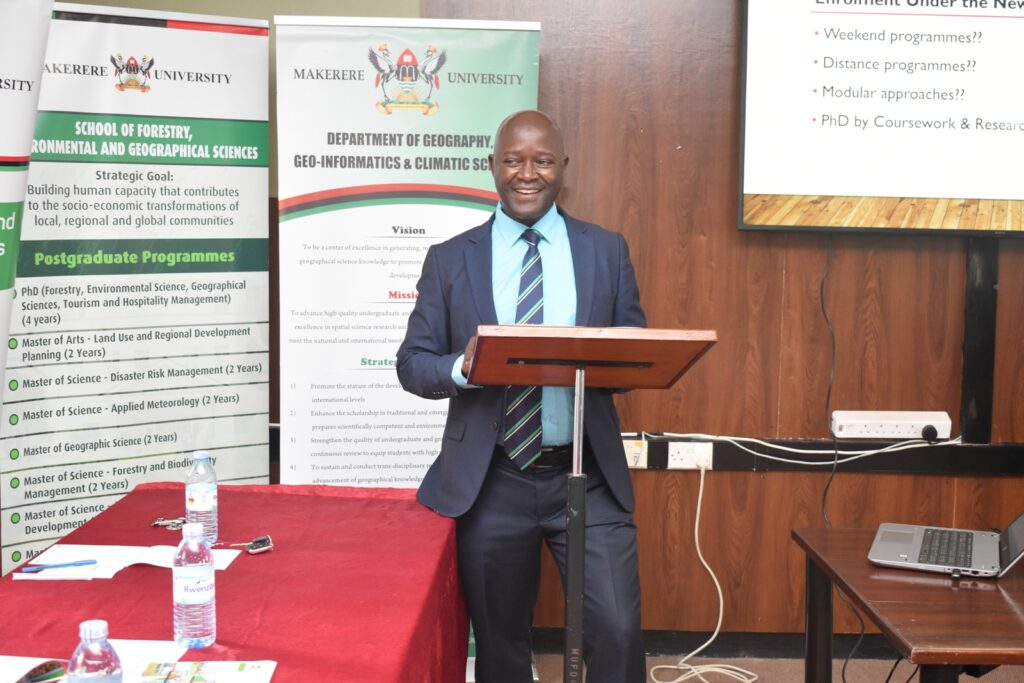
Proposed amendments
1. MSc Disaster Risk Management
The overall objective of the programme is to build national and regional human capacities in reducing risk to disasters and accelerating human security and economic development.
Specific Objectives
- Develop multi-skilled and dynamic professionals with knowledge and novel techniques to assess disaster risks and implement timely measures to efficiently manage disasters
- Impart interdisciplinary research skills for generation of information and knowledge for disaster risk management
- Increase local and regional capacities for anticipation, prediction and management of disaster events
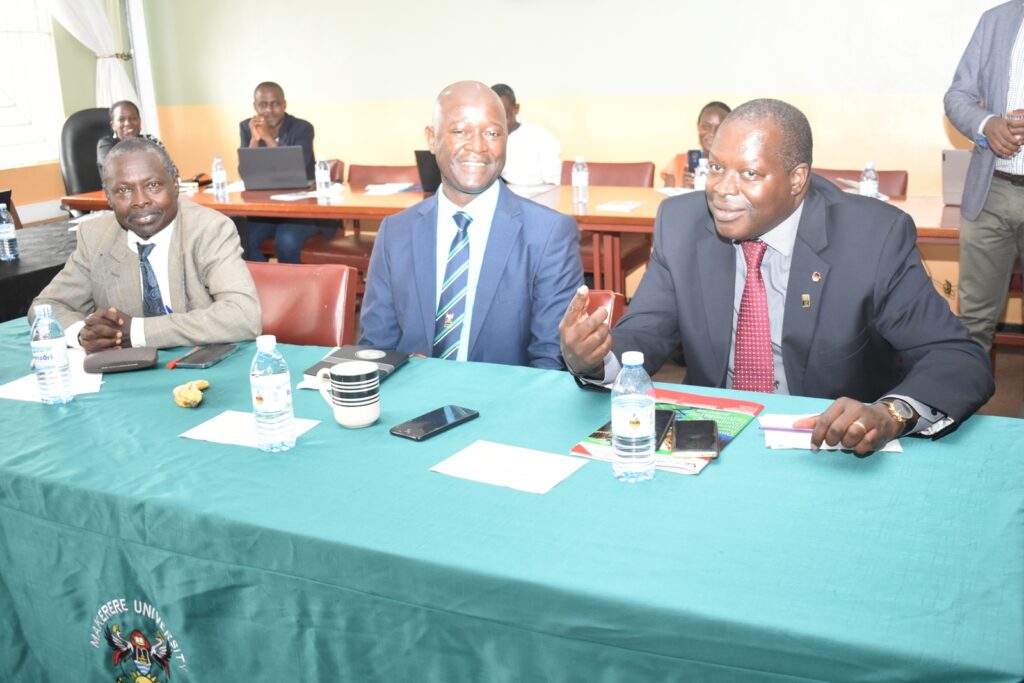
Courses offered
Under the programme, a number of courses are offered including; Principles of Disaster Risk Management, Risk and Vulnerability Analysis, Introduction to Geo-Information Science, Natural hazards Assessment, Legal Frameworks for Disaster Risk Management, Population and Displacement, Extreme Weather Events, Research Methods and Applied Statistics, Disaster Preparedness and Mitigation, Field Exposure and Project Reporting, Earth Observation Techniques for Disaster Risk Management, Economics of Hazards and Disasters, Public Health in Emergencies and Humanitarian Assistance, and Urban Risk Management.
Summary of modifications
All courses have been aligned to the Sustainable Development Goals (SDGs). At the stakeholders’ engagement, proposals were made to include issues of disaster communication & response, resilience, insurance, multi-hazard analysis and climate change. The revised programme will equip students with interdisciplinary research skills to effectively deal with various disasters.
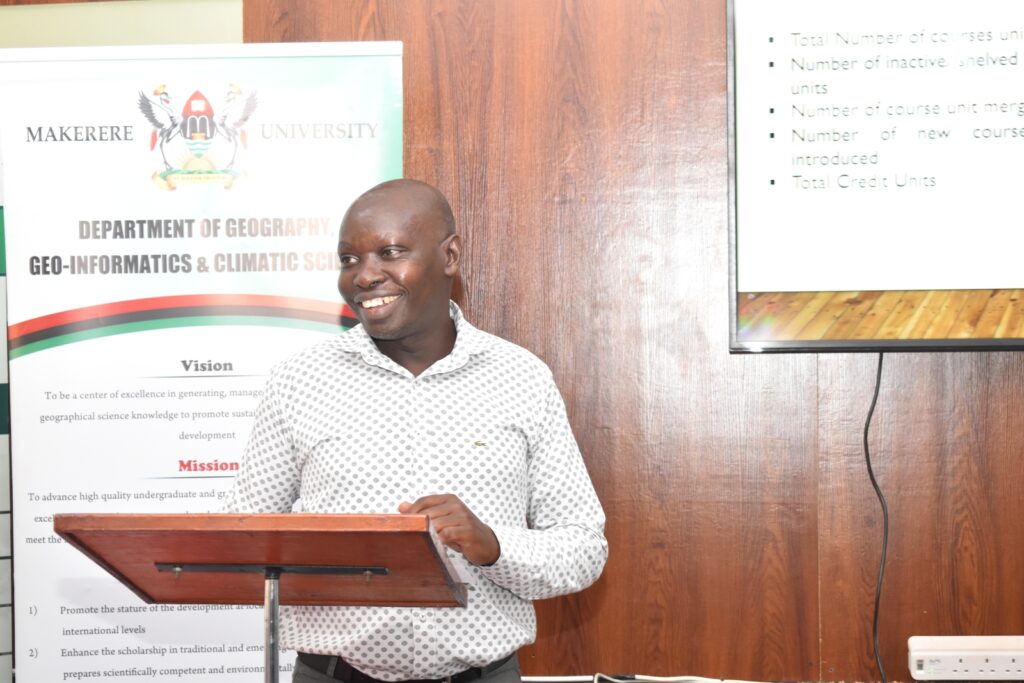
2. Master of Geographical Sciences
The programme aims to build a sought-after human resource pool of graduates with geographical skills and knowledge to address contemporary and emerging issues across scales. It also aims to advance the understanding of Geographical Sciences for graduate students from diverse disciplines, to build capacity in geographic research and information management, and to impart knowledge on the integrating nature of geography for multidisciplinary response to complexities of the world.
Courses offered
The Department offers a wide-range of courses under the programme. These include: Geographical Thought and Applications, Geographical Information Science and Technology, Remote Sensing and Earth Observations, Climate Change Mitigation and Adaptation, Natural Resource Modelling and Management, Applied Economic Geography, Geo-Politics and Development, Soil Conservation and Management, Coastal and lacustrine Geomorphology, Research Methods and Applied Statistics, Land Evaluation and Land Use Planning, Impact Assessment and Auditing, Settlement Analysis and Planning, Population Analysis and Development, Applied Agro-Climatology, Fluvial Geomorphology, Vulnerability and Resilience Analysis and Qualitative Methods in Geography.
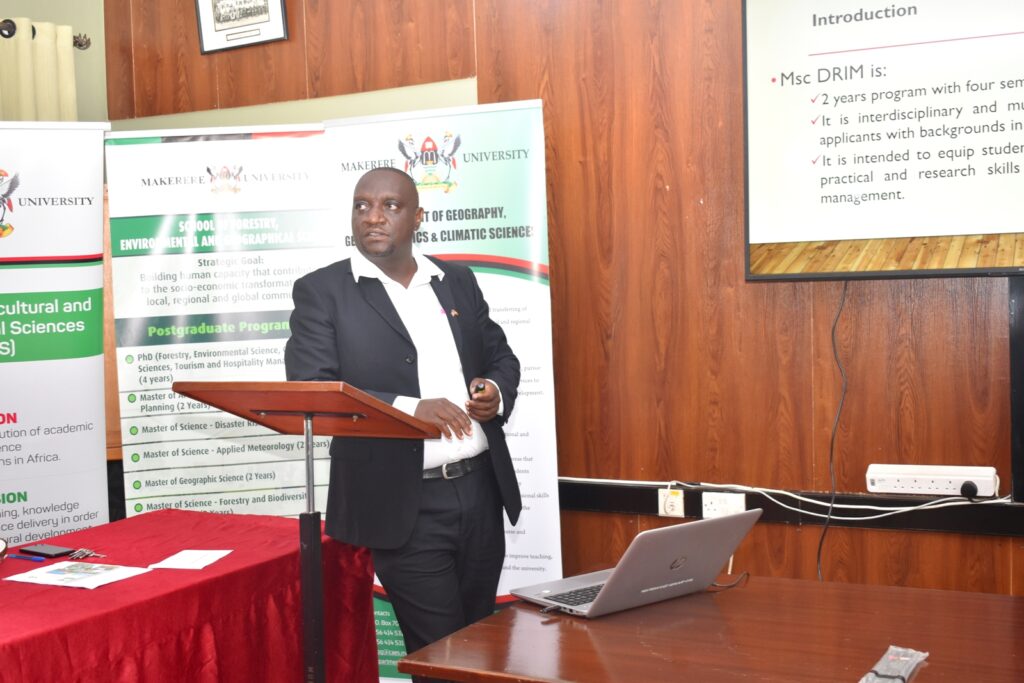
Summary of modifications
The review process aimed to strengthen students’ analytical skills, linkages between theory & practice, and interdisciplinary as well as transdisciplinary focuses. Most of the aforementioned courses remain intact with a few adjustments to improve the content.Proposals have been made to drop the course in Applied Agro-Climatology, merge Coastal and lacustrine Geomorphology (GEO7123) with Fluvial Geomorphology, and to make Vulnerability and Resilience Analysis and Qualitative Methods in Geography new elective courses.
3. Master of Land Use and Regional Development Planning
The programme focuses on how public and/or private land and associated resources can be preserved, developed, and used for maximum social, economic, and environmental benefit. A number of courses are offered in the fields of natural resources management, natural resource economics, public policy, regional and land use planning, environmental impact assessment, applicable law and regulations, government and politics, principles of business and real estate land use, statistical and analytical tools, computer applications, mapping and report preparation, site analysis, cost analysis, and communications skills.
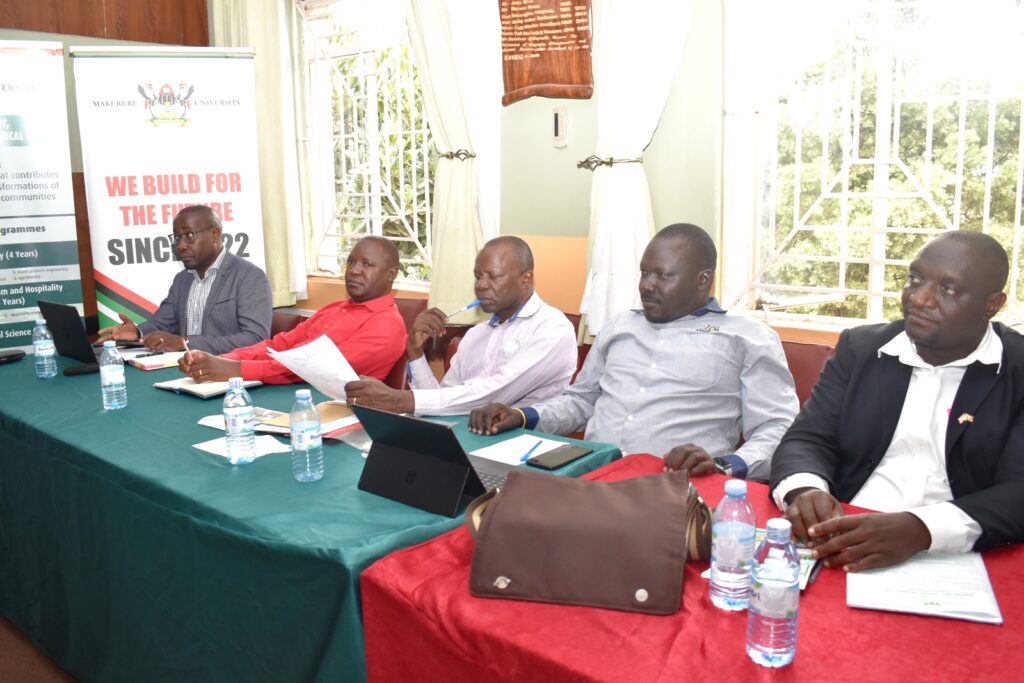
Summary of modifications
Proposals have been made to rename Principles of Disaster Risk Management – Disaster Risk Management and Assessment, and to drop Natural Hazards Assessment, but incorporate its content into Disaster Risk Management and Assessment. Other proposals include; i) renaming Legal Frameworks for Disaster Risk Management – Disaster Law and Policy; ii) Extreme Weather events – Weather Information and Early Warning and incorporate content from Climate Risks and Disasters; iii) Disaster Preparedness and Mitigation course content updated to include aspects of early actions and forecast; iv) renaming Rural Development – Local Planning Economic Development: Theory and Practice; v) Elements of risk management incorporated into Spatial Decision Support Systems; vi) the field course Regional Ecological Planning Studio combined with Integrated Urban Planning and renamed Land Use and Regional Planning Practice; vii) Strategic Environmental Planning and Management strengthened to reflect trends in environmental assessment and monitoring; and viii) Applied Spatial Statistics & Modelling for Planning proposed to become a school-wide course. The new courses include; Qualitative Data Analysis; Advanced Urban Systems Theory; Advances in Regional Science: Principles and Methods; Planning Ethics and Spatial Justice; Planning Law and Governance of Urban and Regional Dynamics or Regional Development Policy Issues and Analysis; Resilience, vulnerability and Regional Development; Inclusive Growth and Development; Infrastructure Geographies; and Critical Perspectives in Agrarian Change.
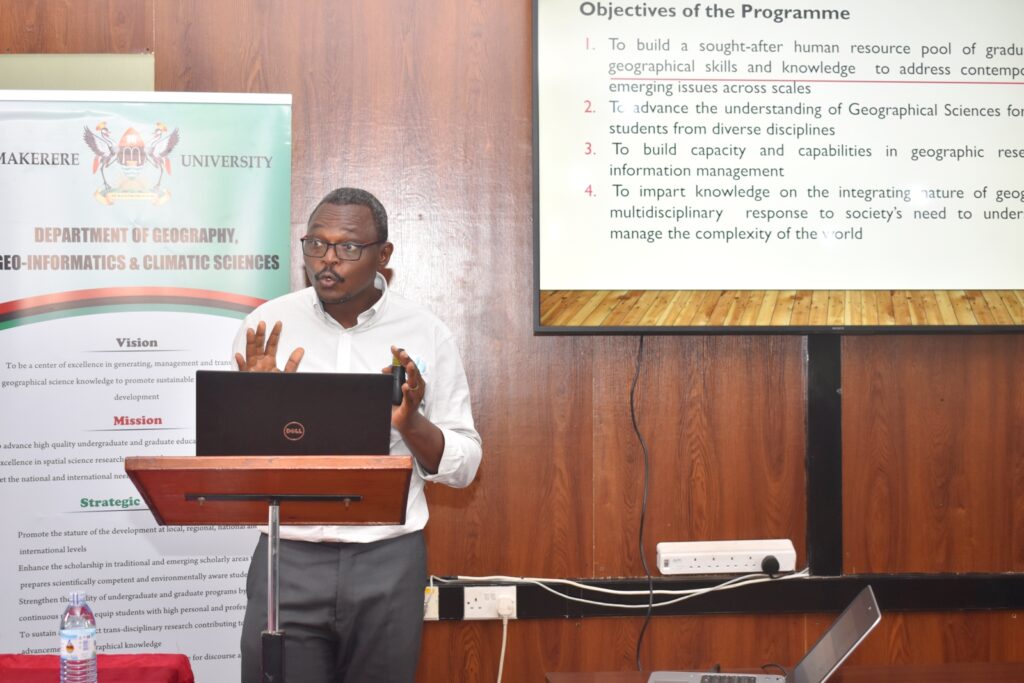
4. Bachelor of Geographical Sciences
This is a three-year Day programme started in the Academic Year 2017/2018 with three students. Intake has grown over time to an average of 30-40 students. The programme admits both A Level and Diploma students. A Level Geography is essential for direct entry.
Objectives of the Programme
The main objective of the reviewed programme is to produce geographers who are knowledgeable and practically skilled in geographical and earth systems sciences, can promote earth stewardship and contribute to sustainable development.
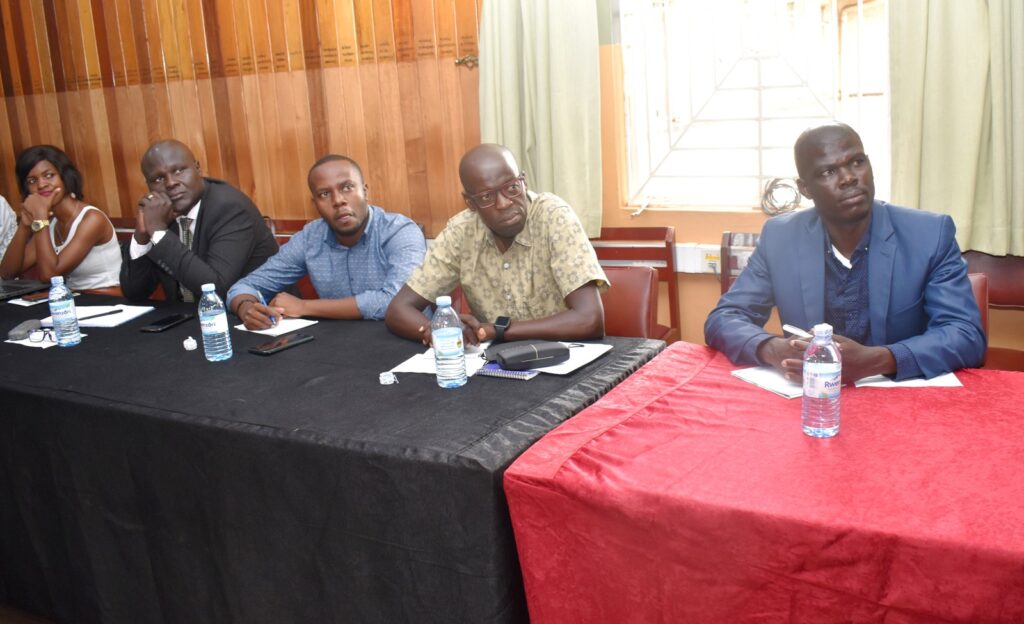
Specific objectives
- Develop competent geographers that have the basic and novel yet transferable knowledge, skills and technologies in geography and earth systems
- Produce competent geographers with knowledge and understanding of the earth’s resource potentials and limits in a geographic context
- Build geographers that have the breadth and depth of knowledge on earth system dynamics and changes
- Train geographers to initiate, plan and execute inquiry and research in topical geographic fields and earth systems sciences
- Develop geographers that have the skills and knowledge in and pathways to attainment of sustainable development
- Train geographers that are adequately prepared to respond to the changing global environmental, and social systems under scarce natural resources
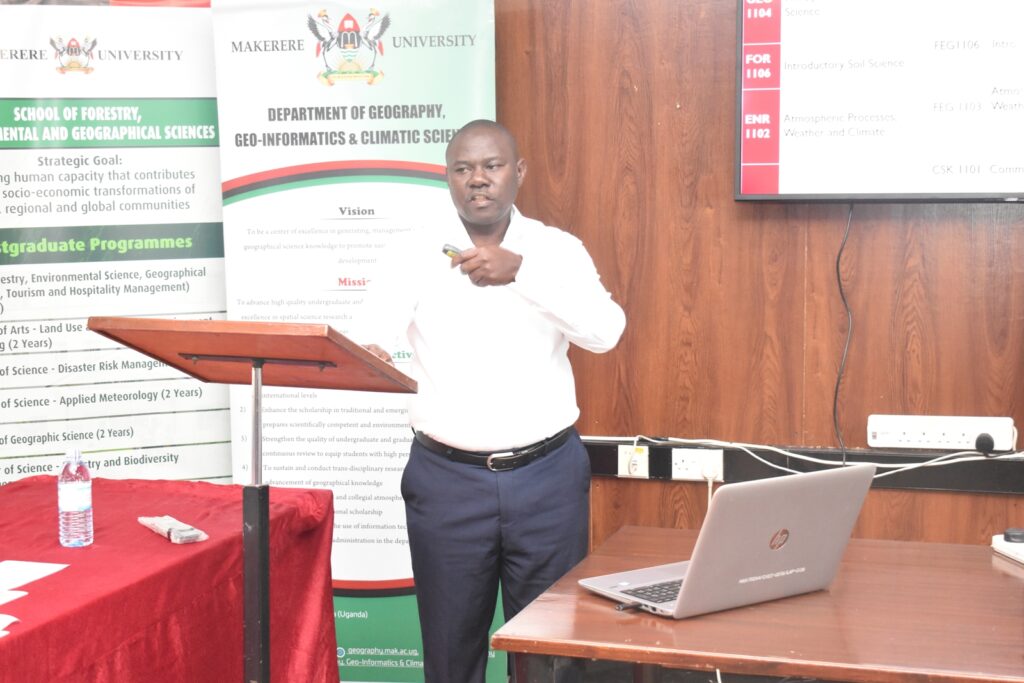
Courses offered
Year 1 – Human Geography, Fundamentals of statistics, Principles of Earth Systems Science, Introduction to Soil Science, Communication Skills, Development Geography of East Africa, Sustainability Science and Development, Fundamentals of Ecosystem Science, Foundations of Cartography and Photogrammetry, and Urbanization and the Environment.
Year 2 – Geomorphology, Applied Cartography and Photogrammetry, Earth Observation Systems, Techniques and Applications, Global Environmental Change, Population Geography, Agriculture, Environment and Development, Risk Assessment and Management, Soil Conservation: Methods and Applications, Fundamentals of hydrology, Sustainable Energy Transitions, Research Methods, Climatology, Advanced Quantitative Techniques in Geography, Principles of Geographical Information Systems (GIS),Economic Geography, Settlement Systems Analysis, Project planning and Management, Development Geography of Africa, Biogeography, Principles of Resource Assessment, Development and Management, Lacustrine and riverine Landscape Management, Arid and Semi – Arid Land Management.
Year 3 – Geographical Thought and Philosophy or Geographical Thought and Practice, Advanced Climatology, Geo-Statistics and Modeling, Advanced Geographical Information Systems (GIS), Demography, Political Geography, Military Geography, Geography and Public Policy Analysis, Highland and Mountain Resource Management, Applied Hydrology / Advanced Hydrology, Land Use Planning and Management, Environmental Degradation and Conservation, Systematic Geography of Uganda, Advanced Geomorphology, Applied Earth Observations Systems Techniques and Applications, Research Project and Dissertation, Urban Geography, Transport Geography, Regional Development Planning, Regional Development Geography of East and South East Asia, Road Safety: Theory and Applications, Environmental Disaster Assessment, and Adaptation and Mitigation to Climate Change.
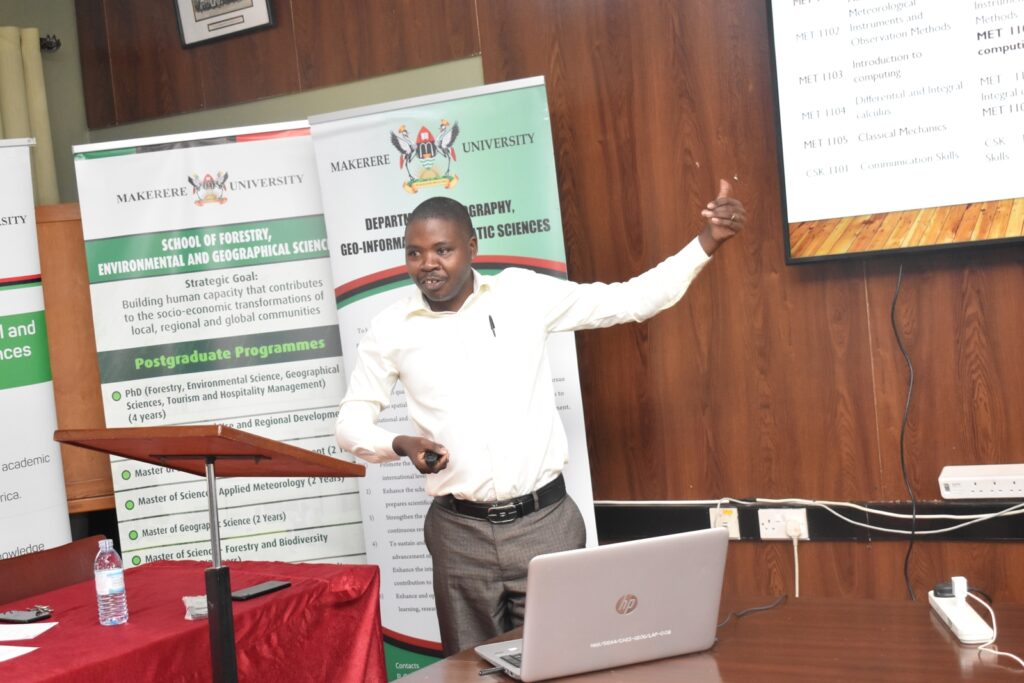
Proposed modifications
i)Human Geography course has been updated to include human environment interactions and implication ii) Introductory Statistics changed to Fundamentals of Statistics, iii) Principles of Earth Systems Science revised to provide foundation for climatology, biogeography, hydrology and geomorphology, iv) Communication skills introduced, v) Atmospheric Processes, Weather and Climate no longer mandatory for BGS students but for other students in the school, vi) Development Geography of East Africa revised to include aspects on constraints to development and possible solutions, vii) Fundamentals of Ecosystem Science revised to integrate issues of Natural selection and adaptation by plants and animals, as well as restoration ecology, viii) Global Environment Change reviewed to integrate issues of land use and cover change dynamics, biodiversity and environmental change assessment, ix) Energy Analysis and Planning changed to Sustainable Energy Transitions, x) Feminism and Geography dropped, xi) Fundamentals of Hydrology introduced, xii) Lacustrine and Riverine Landscape Management course focusing on lake and river systems resource utilization and management introduced, xiii) Project Planning and Management introduced, xiv) Highland and Mountain Resources Management changed to Mountain Sustainable Resource Management, xv) Applied Hydrology and Environmental Degradation and Conservation introduced, xvi) Tourism and Recreation Resource Management as well as Regional Development Geography of Europe and Asia and Wildlife Ecology and Management dropped, xvii) Regional Development Geography of East and South East Asia introduced.
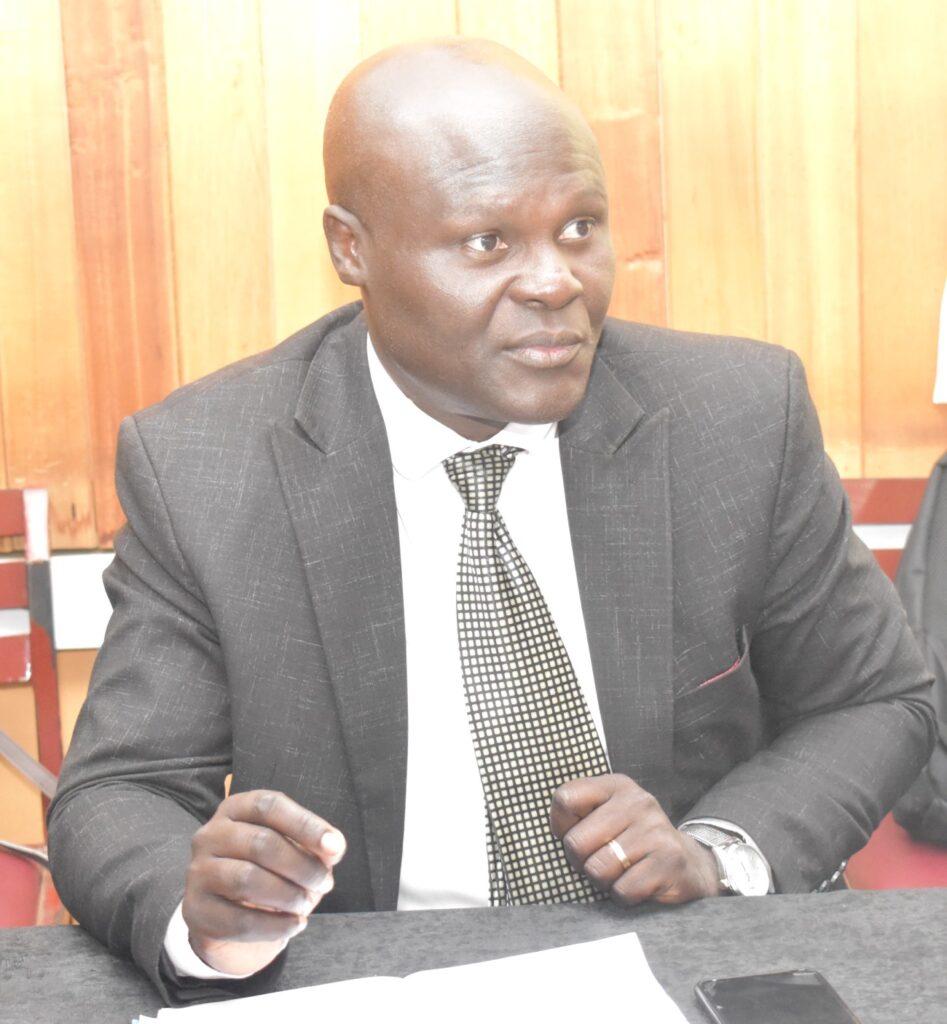
5. BSc Meteorology
This is a three-year Day programme that started in the Academic Year 2011/2012 with 4 students.Intake has been growing over time with an average of 25-35 admitted. The programme admits both A Level and Diploma students. A Level pure mathematics is essential for direct entry.
Summary of proposed courses
Year 1 – Introduction to Atmospheric Science, Meteorological Instruments and Observation Methods, Differential and Integral calculus, Classical Mechanics, Introduction to computing in meteorology, Communication Skills, Thermodynamics, Matrix Algebra and Vector analysis, Tropical Meteorology, Computer programming in Meteorology, Numerical Methods in Meteorology, and Introduction to gender.
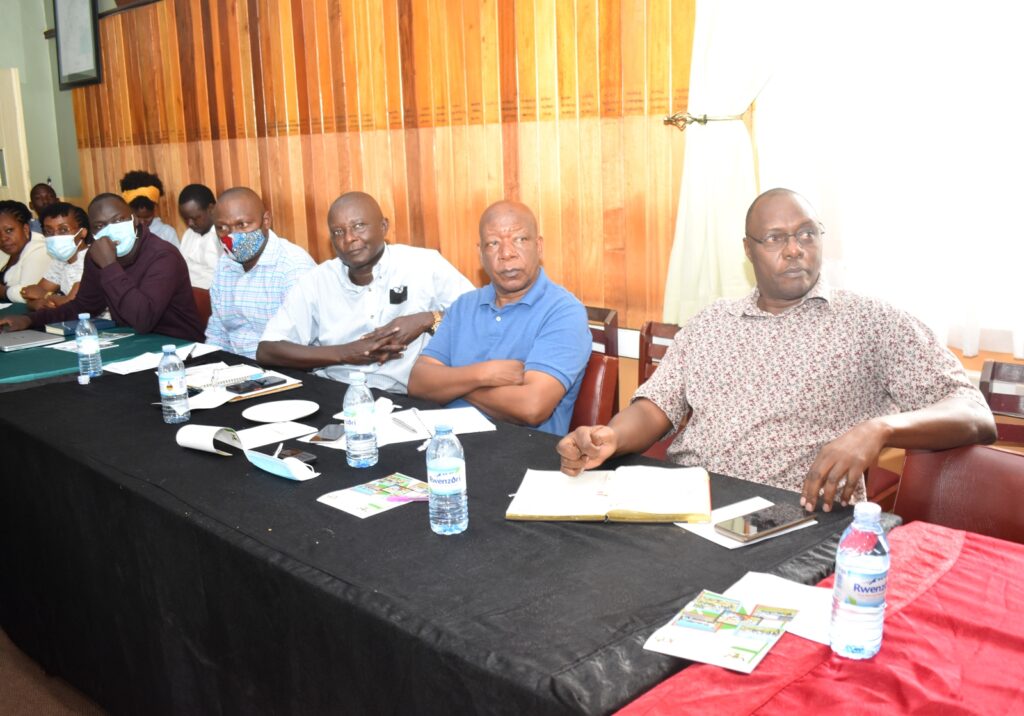
Year 2 – Synoptic Meteorology,Advanced Atmospheric Science, Atmospheric Dynamics, Cloud Physics, Biometeorology, Soil Science and Management, Physical Meteorology, Foundations of climate change science, Weather Analysis and Forecasting, Research Methods, Principles of Geographical Information systems, Renewable energy resources, Marine Meteorology, and Data Information Management in Meteorology.
Year 3 –Remote Sensing in Meteorology, Boundary layer Meteorology, Hydrometeorology, Agro-meteorology, Advanced GIS, Meteorology and Human Environment, Urban Climatology, Elements of Environmental Pollution and Control, Aviation Meteorology, Adaptation and mitigation to Climate Change, Research Project, Societal Climate services, and Integrated Water resource management.
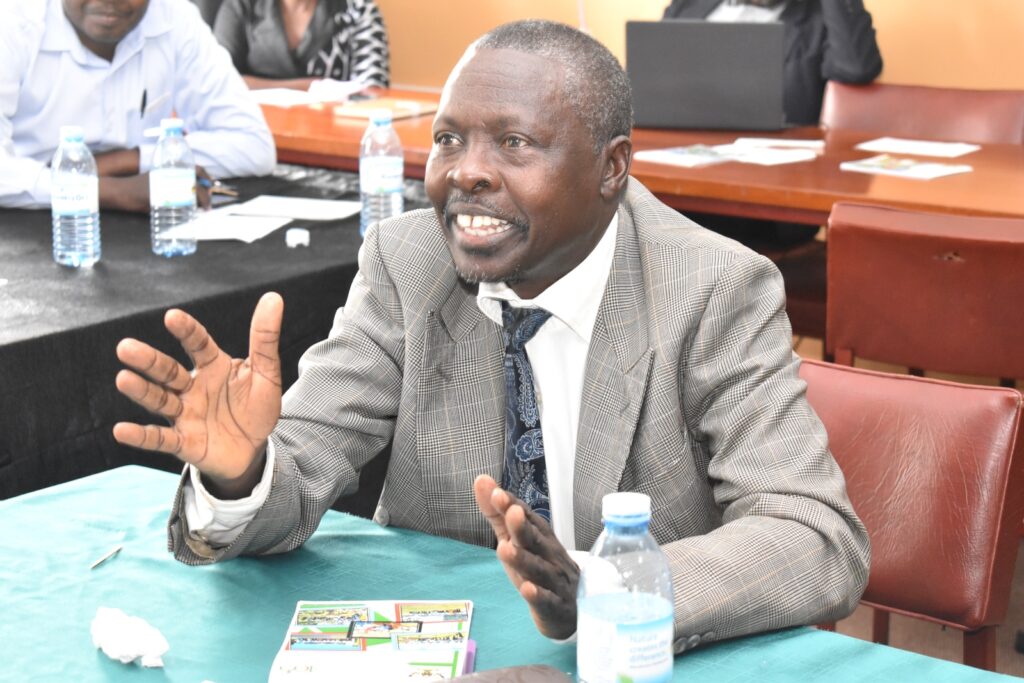
Participants proposed to include climate change and communication skills in all programmes.
The stakeholder engagement was graced by the Deputy Principal, CAES, Prof. Yazidhi Bamutaze who emphasized the need to reflect on the relevance of all programmes offered as the University marks 100 years of existence. The workshop was attended by among others, the Principal, College of Computing and Information Sciences, Makerere University, Prof. Tonny Oyana.
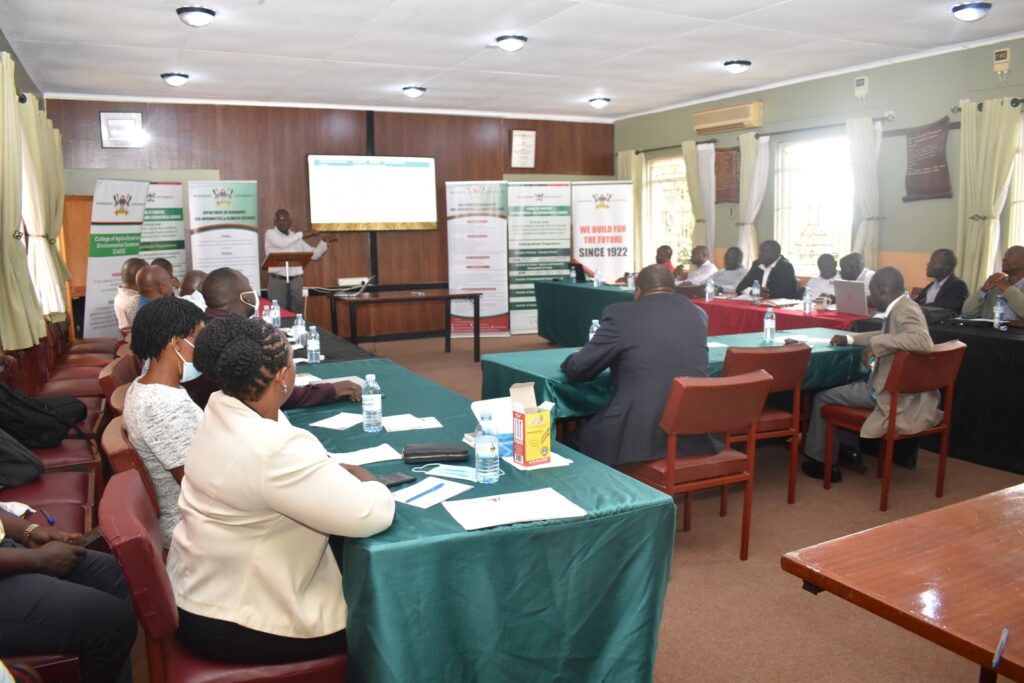
You may like
-
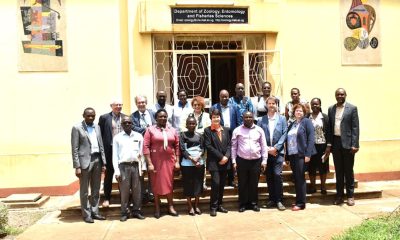

BOKU University Charts New Collaboration Strategies with Mak’s Department of Zoology, Entomology & Fisheries Sciences
-
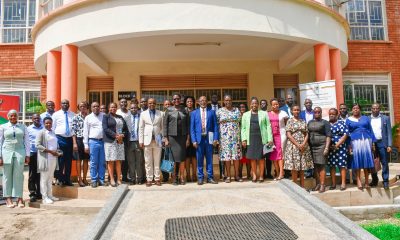

VC Opens Training for MoKCC Officials on Safeguards in Procurement
-


From Adversity to Excellence: The Inspiring Journey of Makerere’s Best Science Student, Esther Ziribaggwa
-


Simon Mungudit: Mak’s Best Performing Male Science Student & Rising Star in Petroleum Geoscience
-


Call For Applications: MakNCD Masters and PhD Training Opportunities
-
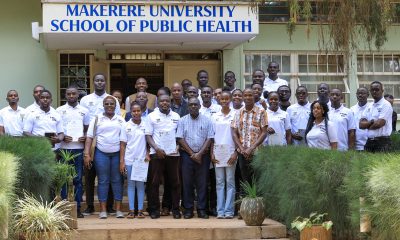

Course Announcement: Certificate in Water, Sanitation and Hygiene (CWASH) – 2026
Agriculture & Environment
From Adversity to Excellence: The Inspiring Journey of Makerere’s Best Science Student, Esther Ziribaggwa
Published
1 week agoon
February 6, 2026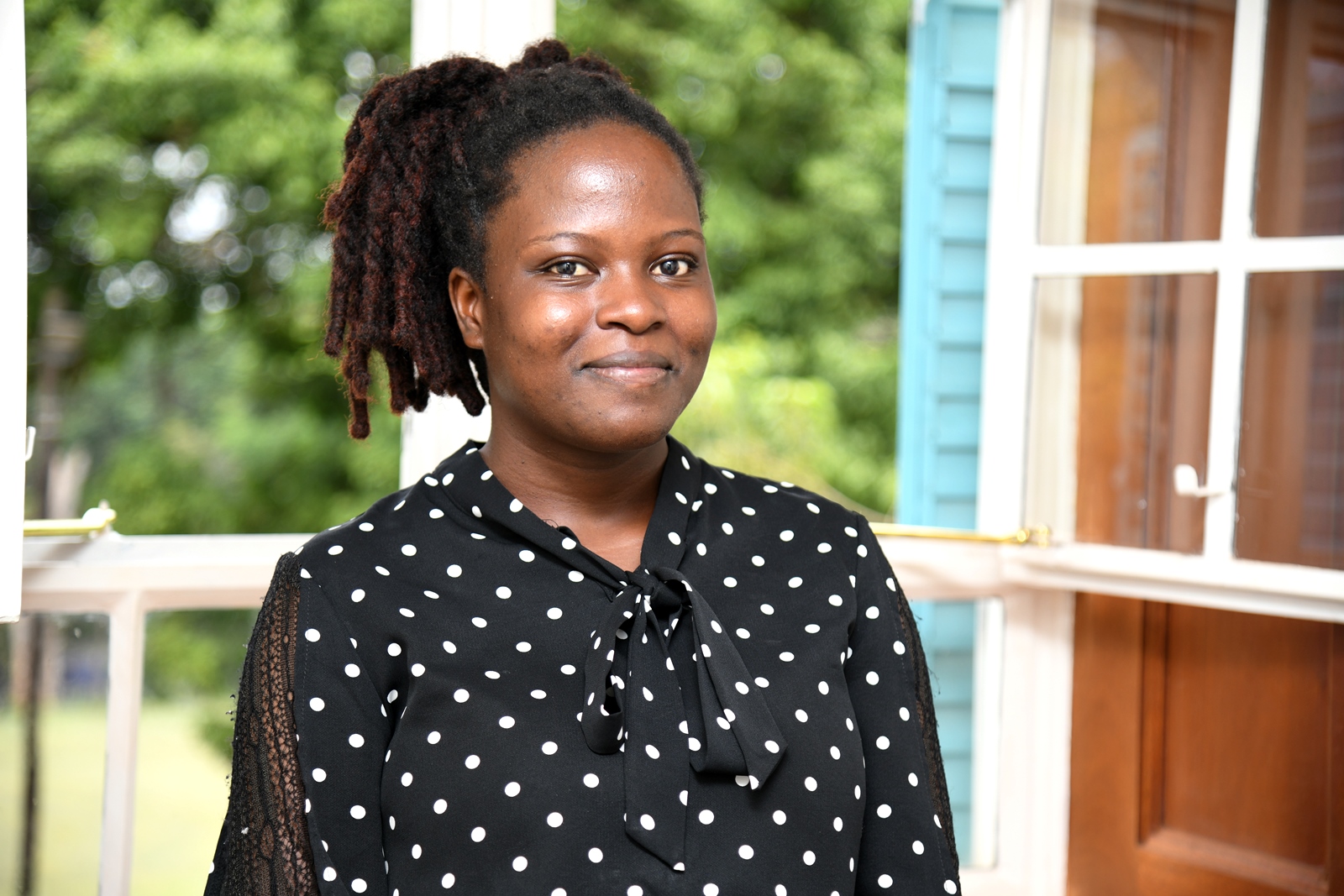
Growing up in Nkonge Village, Kyampisi Sub County in Mukono District, Esther Ziribaggwa learned early the meaning of resilience.
Born to Mr. Musisi Godfrey, a farmer, and Ms. Babirye Resty, a market vendor in Seeta, Mukono District, her journey from humble beginnings to becoming Makerere University’s top-performing student in the Sciences is a testament to her determination, hard work, and unwavering faith. She attained a CGPA of 4.77 in the Bachelor of Agricultural and Rural Innovation, a programme taught at the College of Agricultural and Environmental Sciences (CAES). She will be graduating from Makerere University on 24th February 2026, the first day of the 76th graduation ceremony.
Educational Journey and Navigating the Financial Hurdles to remain in School
Ziribaggwa’s journey to academic excellence has not been smooth. But her parents’ sacrifices laid the foundation for her dreams, even as life presented relentless challenges.
She began her education at Frobel Day and Boarding Primary School and later joined Seeta Boarding Primary School, where she excelled with 9 aggregates in her Primary Leaving Examinations. However, the transition to secondary school presented challenges that tested her resolve.
She joined Mpoma Royal College in Mukono District alongside her sister, who had scored 12 aggregates. Shortly after starting Senior One, their father fell seriously ill, requiring an intestinal surgery, and could not continue to work. With the family unable to pay school fees, both sisters dropped out for a year. It was only through the compassion of the school bursar and the then Head Teacher, Ms. Namazzi Connie, who reduced their fees from 800,000 to 380,000 Uganda Shillings, that Ziribaggwa and her sister were able to return. “The year out of school was a huge setback,” she recalls, “but I focused on catching up. I knew I couldn’t waste this second chance.” Her perseverance paid off. Despite the lost year, she completed her O’ Level with 25 aggregates in eight subjects.
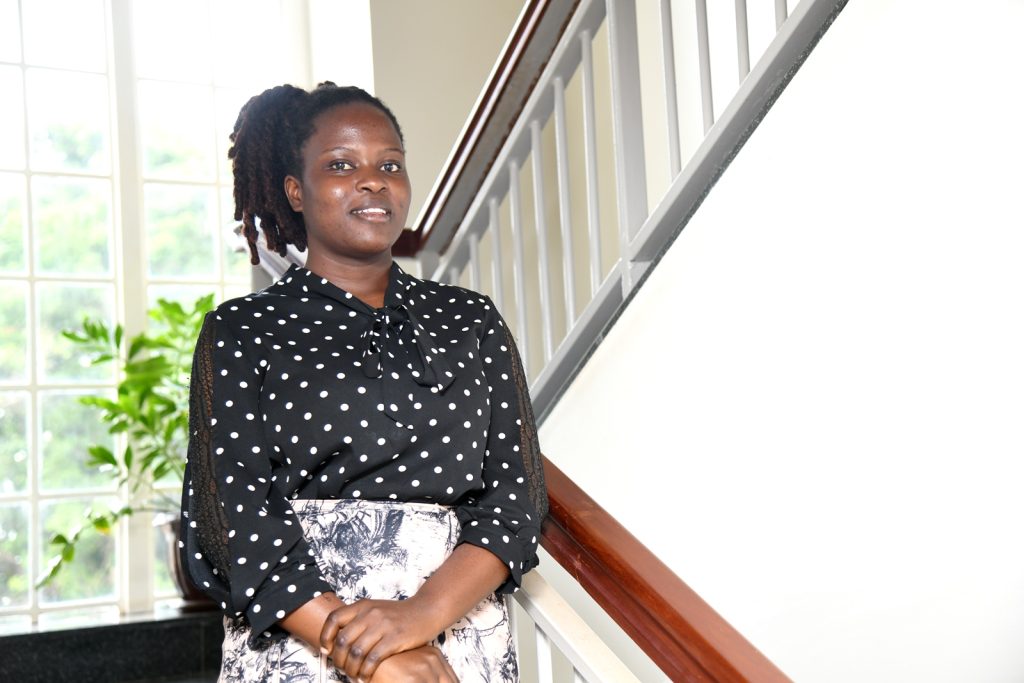
Her A’ Level years were marked by similar challenges. Due to financial constraints, Ziribaggwa attended three different schools. She initially enrolled at Seat of Wisdom Boarding School in Kayunga but was forced to leave when her family could no longer afford the fees. At the time, her father, the family’s sole breadwinner, had undergone a second operation and was unable to work. Her mother, a market vendor, stepped in to support her education and transferred her to Paul Mukasa Day and Boarding Secondary School in Mukono District as a day student. However, the long daily commute was exhausting, leading to a final transfer to Godmark High School in Mukono District where she completed her A’ Level in 2019 with 15 points in Geography, Economics, Agriculture, and Subsidiary Mathematics.
After completing secondary school, Ziribaggwa waited two years before joining university due to financial constraints. Although she had been admitted under the private sponsorship scheme to pursue a Bachelor of Statistics, she was unable to raise the required tuition. Following the outbreak of COVID-19 and the subsequent lockdown, an opportunity arose for her to obtain government sponsorship. At the time, there were no Senior Six leavers, prompting Makerere University to invite applications from candidates who had completed Senior Six within a specified period. The cut-off points across programmes were lowered, enabling her to secure government sponsorship to pursue a Bachelor of Agricultural and Rural Innovation.
Appreciation
She is deeply grateful to the Almighty, her parents, and everyone who supported her educational journey. She is specifically thankful to the Government of Uganda for sponsoring her university education, and to Ms. Namazzi Connie, her O-Level Head Teacher, for subsidizing her school fees. She is also grateful to all her lecturers at CAES and Jesus is King Ministry under the Makerere University Christian Union.
Message of Resilience to Fellow Students
To the students navigating similar challenges, Ziribaggwa shares a message of encouragement. “Never let your situation break you. There’s always going to be challenges, sometimes pushing you to what feels like a point of no return. But those moments should not define your future – they are a test of your resilience. Strive to outgrow them and become a better person, even when the journey feels impossible.”
Career and Aspirations
Ziribaggwa currently works in the extension division of Slow Food Uganda, an agricultural organization based in Mukono District, where her work focuses on women and youth. Although her dream was to become a medical doctor, her love for agriculture has grown over time and does not regret taking on this path. She aspires to become a Senior Agricultural Officer in the country, with the goal of improving farming conditions, particularly in the rural communities. Growing up in a farming community exposed her to many challenges faced by farmers, including unpredictable weather conditions that necessitate irrigation support, and improper use of agrochemical inputs, which pose risks to both soil quality and human health.
Ziribaggwa hopes to pursue further studies in crop and soil science. She draws inspiration from exemplary leaders like Hon. Rebecca Kadaga, former Speaker of the Parliament of Uganda, and First Deputy Prime Minister and Minister for East African Community Affairs. “I have always admired her for being hardworking, resilient, and eloquent,” she says, seeking to emulate these qualities in her own journey.
Agriculture & Environment
Call for Applications: QCF Postdoctoral Research Fellowships
Published
4 weeks agoon
January 20, 2026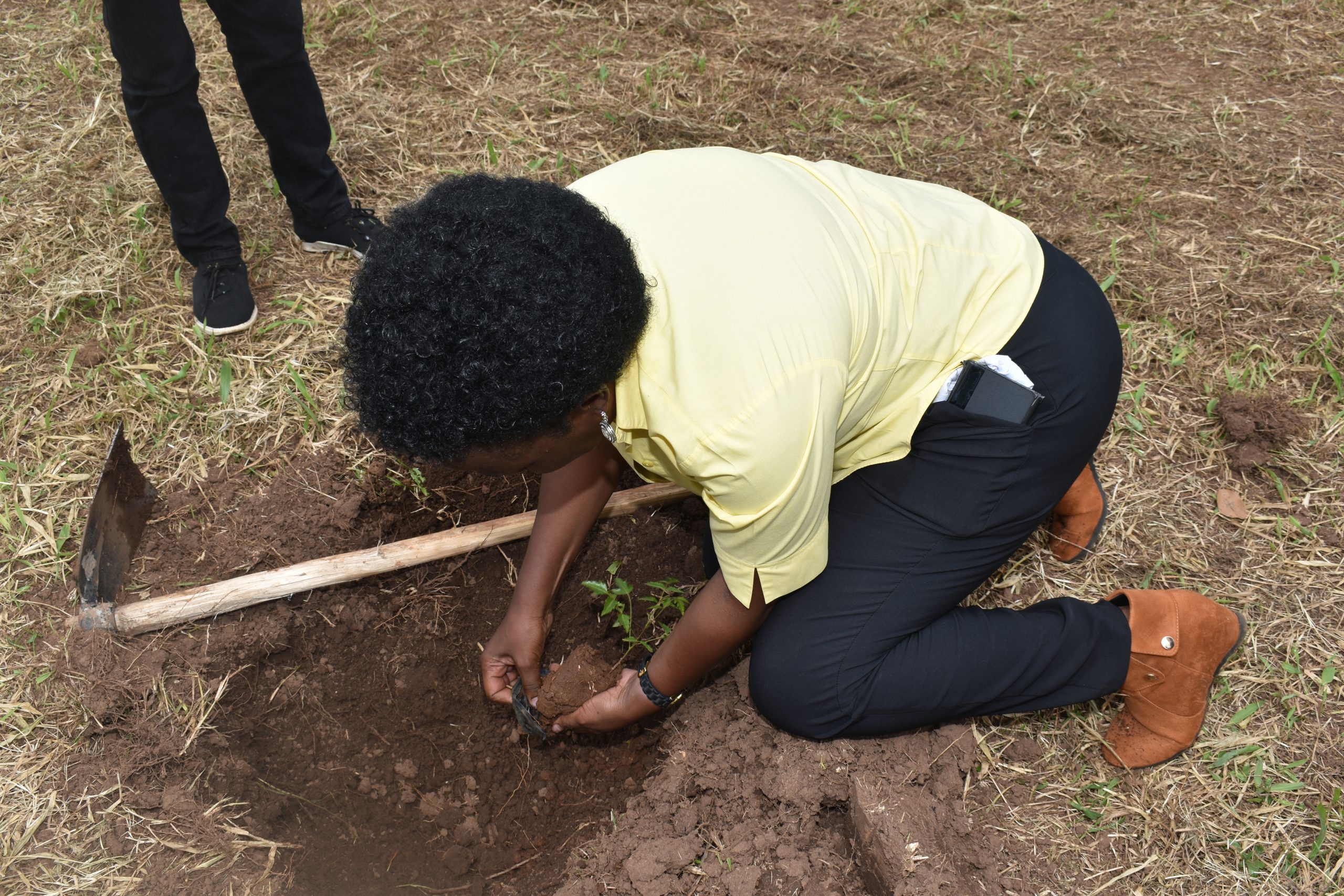
Makerere University’s Department of Geography, Geo-informatics and Climatic Sciences in partnership with Quadrature Climate Foundation and Red Cross Red Crescent Climate Centre are seeking two fellows for Quadrature Climate Foundation (QCF) Fellowship Programme. This is a two-year post-doctoral programme fully funded by QCF, which is an independent charitable foundation working for a greener and fairer future. Applications for the two-year post-doctoral fellowship are invited from individuals with demonstrated interest and expertise in locally led adaptation to climate change research. This initiative is a unique and excellent opportunity to expand the network of interested individuals with researchers and decision-makers, as well as deliver action-oriented research to inform policy and practice. Depending on their interest, each applicant should choose one of the two thematic areas offered under the fellowship program:
- Knowledge co-creation for locally led adaptation to climate change
- Decentralised decision making for effective climate change adaptation and resilience
The Fellow working on the Thematic Area 1: knowledge co-creation for locally adaptation will explore collaborative learning processes (including informal learning) for climate change adaptation among smallholder farmers with focus on Uganda, with linkages to related work in Bangladesh, Mozambique and Nepal. The overall intention is to generate understanding of how decision making processes, across scales, can be linked to local and context specific knowledge systems and process for epistemic just adaptation. The key research questions are:
- What does the process of co-creating knowledge for locally led climate change adaptation look like in a rural smallholder farming setting of a Least Developed Country (LDC)?
- What are the possibilities, promises and pitfalls of knowledge co-creation for locally led adaptation planning?
The research will intentionally contribute to methodological and practice advances in co-creation of knowledge for locally led climate change adaptation.
The research on Thematic Area 2: decentralised decision making for effective adaptation and resilience will undertake scientific interrogation of a climate finance mechanism that has been designed for locally led adaptation and resilience in Uganda. The Fellow will largely focus on testing selected assumptions behind the design of the mechanism. The key questions are:
- How does effective locally led climate change adaptation and resilience building investment decision making look like in practice?
- What works and how does it work? What does not work and why?
Key considerations in the research will include local leadership, inclusion, context specificity, cross-scale, and capability strengthening. The targeted contributions of the fellowship include improved knowledge management for climate resilience planning and decision-making, strengthened evidence-based research-policy-practice dialogues, framework(s) for integrating local and experiential knowledges in resilience building investment decision making processes, among others.
The Fellows will be based, full-time, at Makerere University, Kampala as a core member of the team working on locally led adaptation and resilience. Their work will be conducted under the auspices of the Least Developed Countries Universities Consortium on Climate Change (LUCCC) through which Makerere University is engaged in research and knowledge management collaborations. The Fellowships will focus on Uganda, but with deliberate linkages across LDCs, which might necessitate travels for in-person working meetings.
Roles and responsibilities of the Postdoctoral Research Fellow
The Fellow will be highly motivated to work with a transdisciplinary research team, grow their research expertise, engage with climate change researchers, decision-makers, practitioners and generate different categories of publications. Makerere University will appoint a locally based mentor to the Fellow to provide professional development support. Where needed, the Fellow will participate in teaching and community outreach activities including knowledge sharing in ways that foster collaborative research for adaptation policy and practice.
Requirements:
- A PhD, awarded within the previous three years, in a related discipline (e.g., geography, climate and society, sustainability, adaptation governance, epistemic justice, climate finance).
- Knowledge and experience of locally led adaptation in the agriculture sector.
- Experience in synthesizing and managing datasets and literature.
- Experience in, and knowledgeable of, participatory and collaborative action-oriented research methodologies and tools.
- Demonstrated ability to produce research information products for different audiences.
- Excellent written and verbal communication skills in English
- Demonstrated interest and experience in transdisciplinary collaborations across-scales including with local communities, decision-makers and practitioners in LDCs
- Experience in giving international oral presentations and interest in public communication for wide-ranging categories of audiences
- Data and information visualisation skills will be an added advantage
Application requirements:
Applicants should submit a single PDF with: (i) an application letter not longer than 2 pages that includes indication of theme of interest, a description of research interests, research expertise, and an explanation of how they can work as part of the transdisciplinary research team in line with the fellowship objectives described above; (ii) a CV including a publication list; (iii) copies of academic transcripts and/or certificates; (iv) an example of written work; (v) email addresses of two references who have been directly involved in their PhD research.
Applicants must submit the PDF application document to colocal.caes@mak.ac.ug. Please type “LUCCC PDR Application: COLOCAL-Makerere” as the subject line of the email.
Closing date
Midnight (GMT+3) on 27th February, 2026 or until the position is filled.
Selection process
Eligible and complete applications will be considered followed by communication with short-listed applicants. Makerere University, in consultation with Quadrature Climate Foundation and the Red Cross Red Crescent Climate Centre, will conduct interviews of the short-listed applicants.
If you have not heard from Makerere University within two months of the deadline, please assume your application has been unsuccessful.
Contact details for enquiries about this post-doc fellowship: colocal.caes@mak.ac.ug
Makerere University reserves the right to
- Disqualify ineligible, incomplete and/or inappropriate applications;
- Change the conditions of the award or to make no awards at all
-The QCF Fellowship Programme is a two-year, post-doctoral programme fully funded by Quadrature Climate Foundation (QCF).
-Quadrature Climate Foundation is an independent charitable foundation working for a greener and fairer future. For more information on QCF, please visit qc.foundation.
Agriculture & Environment
Mak-CAES Trains Small-Scale Processors on Soybean Value Addition & Product Development
Published
2 months agoon
December 16, 2025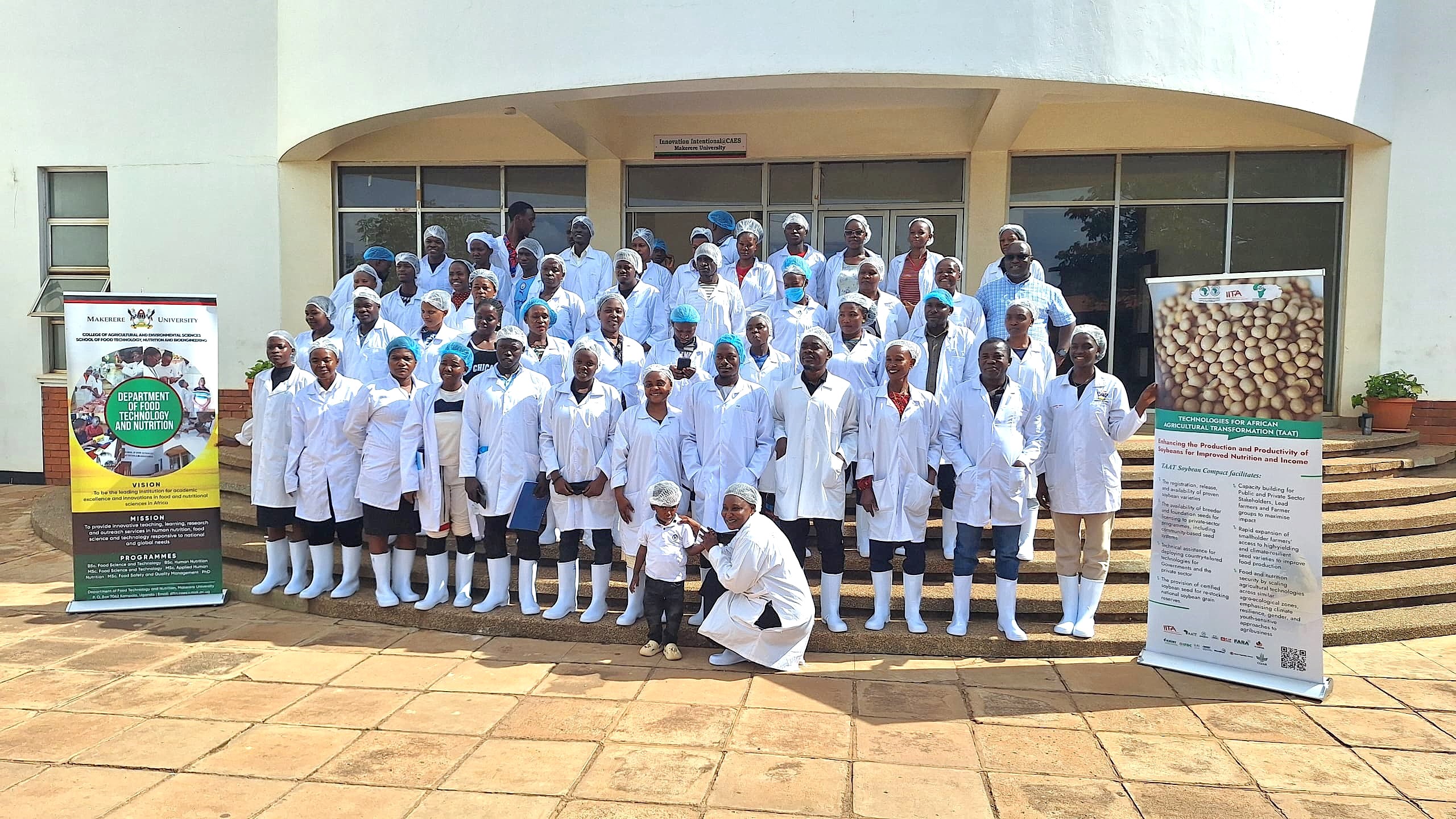
The Department of Food Technology and Nutrition (DFTN), Makerere University, in collaboration with Smart Foods Uganda Ltd, successfully conducted a five-day intensive training on soybean value addition and product development from 24th to 28th November 2025. The training was implemented with support from IITA Uganda under the Training for African Agricultural Transformation (TAAT) Soy Compact Project, aimed at strengthening agro-processing capacities and promoting soybean utilization for improved nutrition and livelihoods.
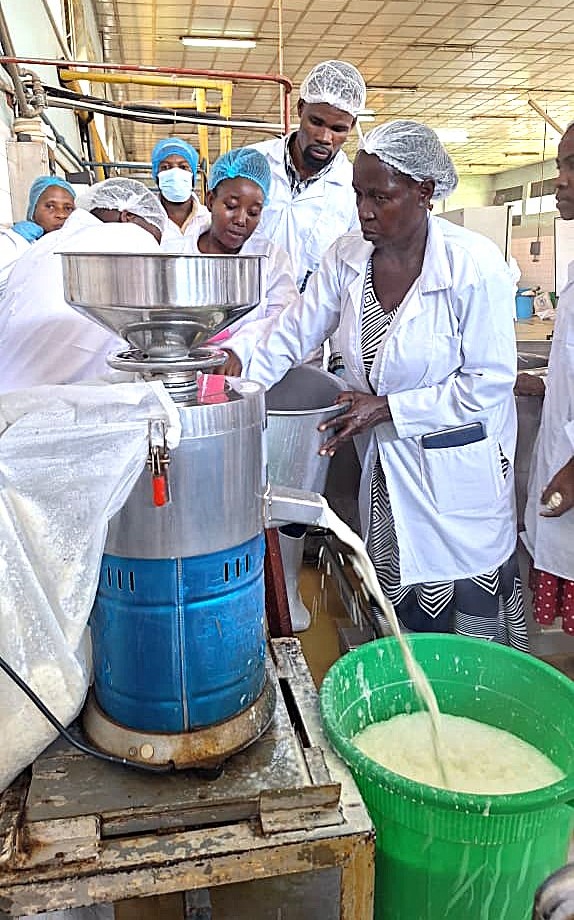
The training program was highly practical and skills-oriented, featuring extensive hands-on sessions designed to equip participants with applicable processing and product development competencies. Most of the practical activities were hosted at Makerere University’s Food Technology and Business Incubation Centre (FTBIC). Participants also benefited from an industry exposure and experiential learning session at Smart Foods Uganda Ltd in Bweyogerere, where they gained first-hand insights into commercial-scale soybean processing operations, quality control systems, and product marketing strategies.

Key thematic areas and technologies covered during the training included soybean nutrition and associated health benefits; assessment of quality attributes of soybeans and soy-based products; application of Good Hygiene Practices (GHP) and Good Manufacturing Practices (GMP); and processing of high-quality soy products. Practical sessions focused on the production of soymilk, tofu, soy yoghurt, soy flour, and soy coffee, as well as the formulation of soy-fortified composite porridge flours. Participants were also trained in the development of various soy-based bakery products, including bread, mandazi, daddies, and baghia. In addition, sessions on marketing, branding and positioning of soy products, as well as UNBS certification requirements and documentation, were conducted to enhance market readiness and regulatory compliance.
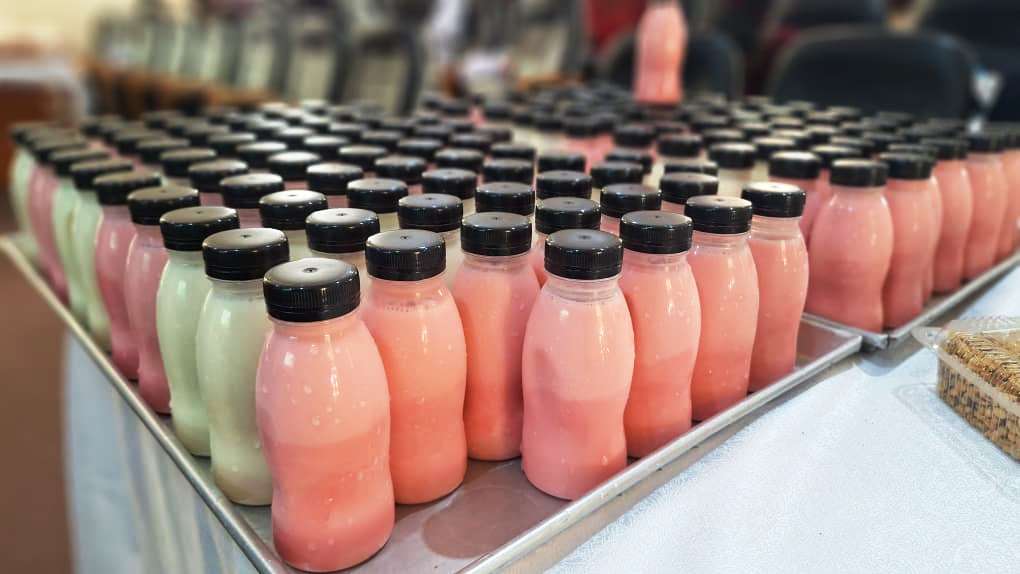
The training attracted a total of 57 participants, comprising small-scale soybean processors and graduating university students, thereby fostering knowledge exchange between academia and industry. Overall, the training contributed significantly to building technical capacity in soybean value addition, promoting entrepreneurship, and supporting the development of nutritious, market-oriented soy-based products in Uganda. The School of Food Technology, Nutrition, and Bioengineering, under the leadership of Dr. Julia Kigozi (Dean), conducts periodical trainings for agro-processors across the country to enhance technical capacity, improve product quality, and promote the adoption of modern, safe, and sustainable food processing practices. These trainings are designed to equip agro-processors with practical skills in food safety, quality assurance, value addition, post-harvest handling, nutrition, and bioengineering innovations, thereby enabling them to meet national and international standards. Through this outreach, the School contributes to strengthening agro-industrial development, reducing post-harvest losses, supporting entrepreneurship, and improving food and nutrition security while fostering stronger linkages between academia, industry, and communities.
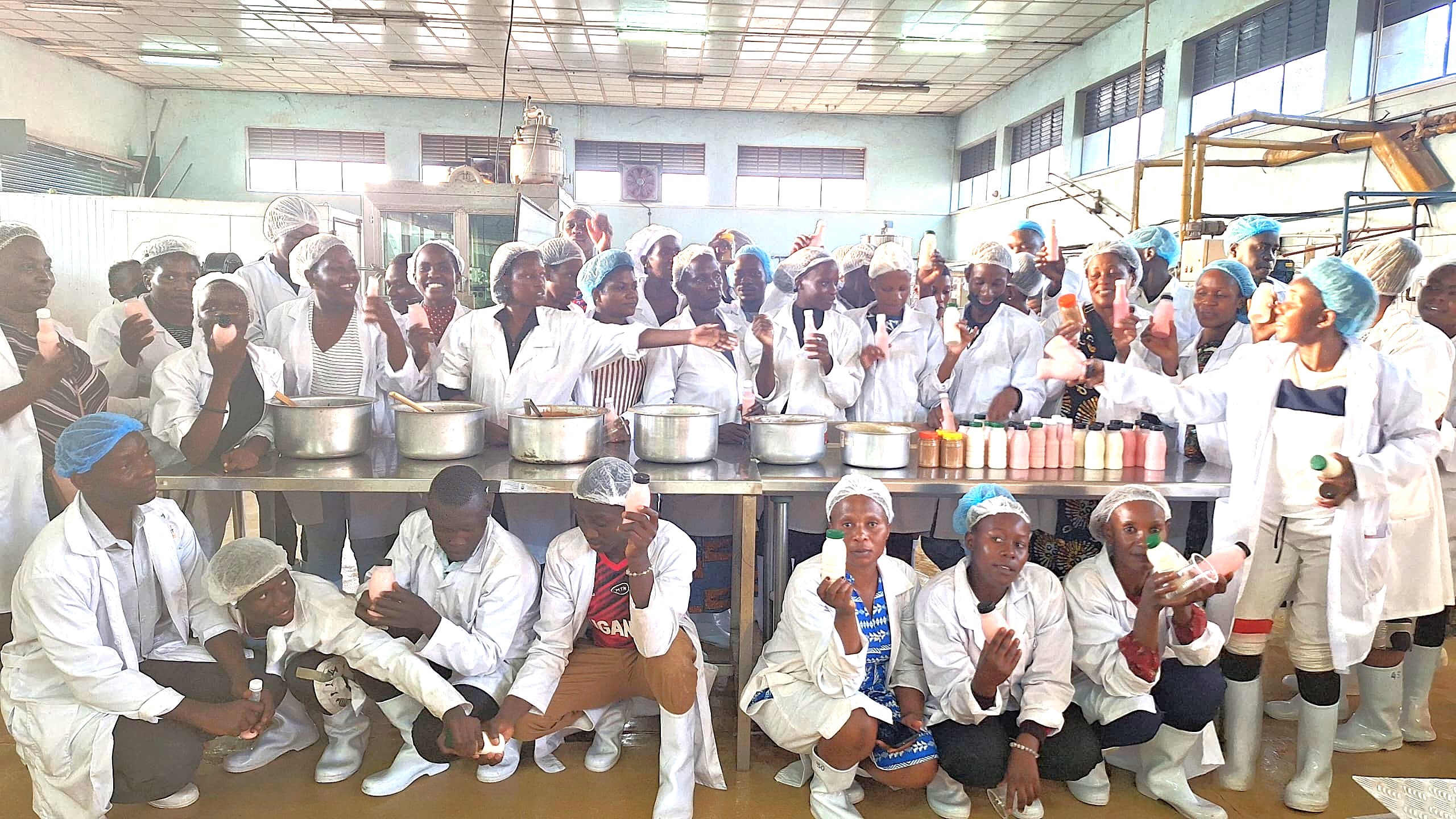
Trending
-

 General2 weeks ago
General2 weeks agoCall for Applications: Admission to Postgraduate Programmes 2026/2027
-

 Natural Sciences2 weeks ago
Natural Sciences2 weeks agoSimon Mungudit: Mak’s Best Performing Male Science Student & Rising Star in Petroleum Geoscience
-

 Agriculture & Environment1 week ago
Agriculture & Environment1 week agoFrom Adversity to Excellence: The Inspiring Journey of Makerere’s Best Science Student, Esther Ziribaggwa
-

 General6 days ago
General6 days agoAptitude Exam (Paper 1) Results for the Mature Age Entry Scheme 2026/2027
-

 Health2 weeks ago
Health2 weeks agoEU Earmarks Shs19.8bn for 15 Joint PhD Scholarships in Health, Environment Research
